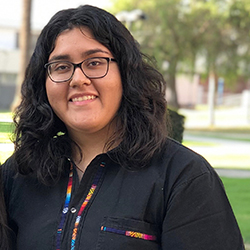Jamie Alvarez

Compton College student Jamie Alvarez knows she has potential and does not let the barriers she has faced stop her from shooting for the stars, literally. "My high school did not really prepare me to go to college and I felt my academic knowledge was not strong enough." said Alvarez. "When I first started at Compton College in spring 2017, I regretted it. I was placed in Math 80 - Intermediate Algebra for STEM and was really struggling with it, so my instructor suggested I check out the STEM Center for help."
The mechanical engineering major and STEM Club president now has her sights set on a future career at NASA. Alvarez is on track to graduate from Compton College with an associate degree in spring 2020 and hopes to transfer to Johns Hopkins University Whiting School of Engineering or possibly the California Institute of Technology (Caltech).
"I am interested in both aerospace and biomedical engineering which is why I chose mechanical engineering as my major," she said. "My ultimate goal is to work with NASA doing biomedical engineering, working on projects such as engineering space suits for astronauts." The Bioengineering Branch at NASA develops next generation technologies to enable humans to live beyond low Earth orbit for extended periods of time with life support systems that need minimal resupply.
She credits the many student resources available at Compton College for enabling her to pursue her career dreams, specifically the STEM Center and Extended Opportunity Programs and Services (EOPS), which provides extra support in the form of guidance; personal, academic and career counseling; book vouchers; educational supplies; transfer assistance, and more.
Thanks to Compton College's STEM Center, Alvarez has secured two internships that are providing hands-on experience and networking opportunities. Last summer, she participated in the NASA Community College Aerospace Scholars (NCAS) program, which gives community college STEM students an authentic NASA experience and encourages them to pursue a NASA-related field or career. The NCAS program begins with a five-week online course leading up to a four-day program at a NASA center, offering students the opportunity to interact with NASA engineers and other subject matter experts to learn about the different types of careers available in science and engineering. In summer 2019, Alvarez worked with a team of other students to build a rover for NASA. She gained invaluable experience in engineering, teamwork and collaboration.
In addition, Alvarez is one of only 10 students from California selected for the year-long 2019-2020 Caltech Aerospace Mentorship Program. She and the other students meet once per month at the Graduate Aerospace Laboratories at Caltech (GALCIT) in Pasadena, Calif., to learn from current Aerospace Graduate Student STEM Fellows at Caltech. She visited GALCIT for the first meeting in October 2019 and is looking forward to learning about the current research being conducted there. During the first semester, the students will learn about aeronautics and during the second semester, students will get more hands-on by working on an engineering project or research.
"It is hard to balance all of this, because I didn't really have a busy schedule when I was in high school. I am learning discipline and responsibility; and mostly doing it on my own." said Alvarez. She appreciates her mom for supporting her, as well as Lorena Fonseca, Compton College program specialist at the STEM Center for helping her stay on her path.
As the new STEM Club President, Alvarez is working on expanding project and learning opportunities for club members, as well as encouraging students from all science and math disciplines to get involved. Current planned club activities include working in the campus greenhouse and on the compost boxes, partnering with the Reaction Research Society in Gardena, Calif. on a rocket engineering project, participating in Compton College's High Altitude Balloon project in the spring semester, and collaborating with Loyola Marymount University on CubeSat, a type of miniaturized satellite that will orbit the Earth for research purposes.
"Most of the students currently in STEM Club are biology and chemistry majors." said
Alvarez. "We want students to know that STEM club is not just for engineering majors
- any student that is interested is welcome to join or come see some of the hands-on
projects we are working on."








